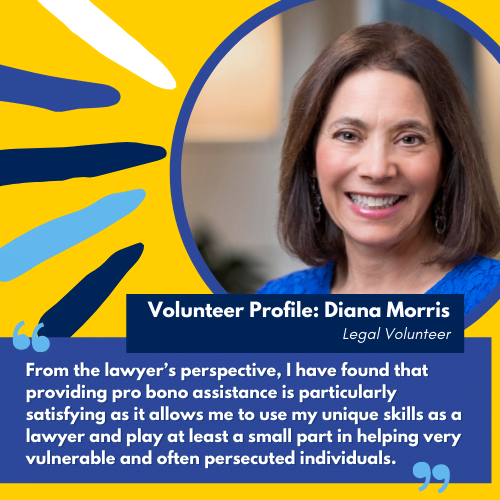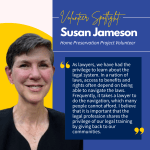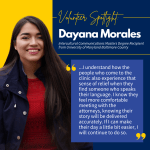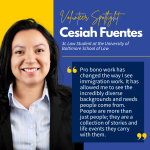Volunteer Profile: Diana Morris, Esq.

What has been the arc of your legal career?
My first legal position was serving as an Attorney-Advisor in the U.S. Department of State. I was very happy to serve as counsel to the Refugee Bureau. A key component of my responsibilities involved interpreting and implementing the Refugee Act of 1980, bringing the United States into compliance with international law. That job ignited my deep interest in refugee—and immigrant—protection.
Since leaving the Department of State, I have used my legal training to oversee human rights and social justice programs at various foundations. As a program officer at the Ford Foundation, I had the opportunity to develop and launch its Refugee and Migrant Rights Program. During that period, we created organizations that were missing from the field as well as strengthened nonprofit organizations processing asylum claims, bringing important class actions, helping to shape new immigration laws and statuses, and running pro bono programs. Unfortunately, many of the protection needs and issues that we sought to address then continue to this day. And, countries--including the United States—are less welcoming, and more people feel forced to leave their homes.
My social justice work in the Ford Foundation’s Nairobi office allowed me to get to know and support courageous lawyers in East and Southern Africa who often put their own safety at risk in order to protect human rights and constitutional protections. We supported others who helped to rebuild and strengthen national law schools as well as develop key areas of law, from women’s rights and human rights to consumer rights. My legal training enabled me to use an international law framework to shape these grantmaking programs.
At the Open Society Institute-Baltimore [OSI], we were able to strengthen the immigration clinic at the University of Maryland School of Law and persuade the City to contribute to and support the Safe City Baltimore Fund, which provided legal education and representation to immigrants, including many unaccompanied minors. In addition, we supported several OSI Community Fellows who focused their creative, entrepreneurial improve the health and well-being of refugees and asylum seekers. For years, I also directed the Community Lawyering Program at OSI, which enabled public interest law groups in Maryland to become stronger organizationally and collaborate with each other more effectively. More broadly, my legal training positioned me to oversee the work of the program directors—all of whom were also lawyers—to reform criminal and juvenile justice, education, and drug addiction policies and practices so they were fair, did not disproportionately and destructively affect people of color, and protected individuals’ rights and dignity.
Which of PBRC’s projects do you volunteer with, and how did you get involved?
After more than two decades at Open Society, I became a philanthropic and nonprofit organization consultant and, suddenly, had some free time. Given the hostile immigration policies of the last Administration, I wanted very much to do something to improve the ways in which asylum seekers and other undocumented immigrants were being treated. PBRC’s Maryland Immigrant Legal Assistance Program offered the perfect opportunity for me to get involved. It provided an extremely well-organized training session as well as a helpful overview document to prepare me to participate in its Immigrant Triage Program. In that program, I have screened and provided immigrants information about their legal options and referred them to organizations that could provide them legal representations. Every step of the way, PBRC’s knowledgeable and welcoming staff were there to answer my questions, review my recommendations for each client, and clearly outline the next steps I should propose to the client.
What is the problem this project addresses?
Immigrants have no right to counsel in their asylum or deportation cases, despite the dire consequences they confront. Some immigrants, including unaccompanied minors, are recent arrivals who have experienced terrible conditions and assaults during their migration to the United States as well as detention upon entering the country. Others have lived and worked in the United States for many years, often have citizen children, and hold jobs that few Americans want to fill. All live in the shadows, with the tremendous fear of being deported, leaving family behind, and returning to hostile, often dangerous environments.
While there are wonderful nonprofit organizations and attorneys in private practice that assist immigrants, there simply are not enough. Yet, with English language difficulties, a lack of familiarity with the U.S. legal system, and a fair amount of misinformation, these immigrants truly need legal advice and representation. PBRC helps to fill this gap, training volunteers to provide triage services and, in some cases, legal representation. Among other things, this work enables the nonprofit organizations helping immigrants to work more efficiently. And, for the clients who sign up for these services, it gives them accurate information and a course of action.
What, if anything, did you find surprising about remote volunteering? What has been rewarding? What, if anything, has been frustrating?
Working remotely adds some logistical issues. For example, internet connections can be shaky, and the client may not be in truly secluded setting. Reading body language is particularly difficult. It is possible, however, that the remote connection—including the ability to speak from home—is a little more comfortable for the client; and, that is important, as clients often need to share sensitive information about traumatic events as they respond to questions. Whether working in person or remotely, I have learned that there is a real value to my posing follow-up questions and asking questions several times, in a unique way. By taking time to listen carefully and then ask for more details, clients often convey key facts that will have significant—i.e., helpful—impact on their claims.
How important do you think pro bono work is to the legal profession?
I think lawyers providing pro bono legal assistance are extremely important. Only about 20 percent of low-income people needing legal assistance receive it. And individuals who are marginalized from the mainstream in some way—for example, immigrants in fear of deportation and people of color who do not have confidence in the legal system—are often the last to get the legal information and assistance they need. Federally funded legal services are prohibited from assisting immigrants. While the gap is large, pro bono attorneys can provide life-saving education and representation to immigrants. Even when the options are few, clients are empowered by knowing their rights and being able to plan accordingly. From the lawyer’s perspective, I have found that providing pro bono assistance is particularly satisfying as it allows me to use my unique skills as a lawyer and play at least a small part in helping very vulnerable and often persecuted individuals. And, as Bryan Stevenson has urged, providing pro bono assistance allows me to be proximate with those individuals and develop greater understanding of and empathy for what they are confronting.
Is there a particular moment or memory that stands out for you?
It is not so much that one individual client stands out to me. Rather, I am struck by the courage and resolve of these immigrants, the tragedy of the conditions and actions that have caused them to uproot themselves from their home countries, and the importance they place on protecting their family, motivating them to endure all sorts of hardships and uncertainty.
What message would you give to attorneys thinking about volunteering?
Don’t hesitate! PBRC’s training is excellent, and the staff are right there with you, each step of the way. You can sign up for sessions with clients that fit into your schedule. And, when you despair about today’s headlines, you will know that you are doing your part to help people receive the protections they are due.
For more information about volunteering in Maryland, please contact: education@probonomd.org







